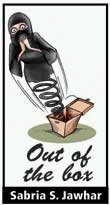Friday, 19 January 2007
By Maha Sami Aboulola
The Saudi Gazette
JEDDAH
SAUDIS have adopted traditions during the first day of the Hijra New Year that keep them optimistic about the year ahead.
“The tradition we focus on is having white and green in our food or in our drinks during the first day of the year,” said Jameelah Sheikh, a homemaker in Jeddah. The colors are symbols of purity and fertile days, which they hope will be with them during the coming year.
Most families like to cook mallow (molokhieh) for the meal and to have a cup of milk on that day, to be sure they have used the two colors on the exact day, said Sami Muhammad, a Jeddah businessman.
It’s not the kind of food they eat which will change how the New Year will turn out. By gathering around the meal, the family wishes to be surrounded with beloved ones to their hopes and expectations, said Azza Aboubakor, a sociologist in King Abdulaziz University in Jeddah.
“Being positive about what is going to happen during the coming year is not enough if you don’t have the people you love and trust around you. Gathering during that specific time, they feel they will always be connected, giving comfort to family members,” Aboubakor said.
The month of Muharram, when the Prophet Muhammad (peace be upon him) migrated from Makkah to Madina in July 16, 622 A.D., marks the beginning of the Islamic year.
According to Dr. Eimad Mohsin, a psychologist in Jeddah, New Year’s Day has always been seen as the day for cleaning houses and wearing new clothes. On the other hand, many people also wait for that day to make some changes in their lives.
“On the day, people start to think about their aspirations during the coming 365 days, like deciding to stop smoking, lose weight, study more, exercise often or pay off their credit card debt. They also use colors they like, just to give them a push toward their hopes and expectations,” Mohsin said. “Instead of counting down the seconds before the start of the New Year, Saudi families gather during lunch or dinner to celebrate, eating particular kinds of food.”
Muslim scholars accept the new traditions that have spread among families recently as a hopeful forecast for the coming days.
“As long as these gatherings around food are not going beyond a cheerful wish, it is acceptable in Islam. But if people get to the point where they think avoiding these traditions may stop good from happening during the next year, then Islam is against it,” said Abdullah Al-Muslim, a dean at the Islamic Law College in Riyadh.
“People must believe despite whatever they do during the first day of the New Year, good things only come from Allah.”
All around the world, people celebrate the advent of a new year in traditional ways.
In South America, New Year is celebrated by making a fake person or dummy. The dummy should be completely dressed and stuffed with old newspapers and firecrackers and placed outside the home.
The dummy represents something that happened during the last year.
At midnight, each family lights the dummy on fire. As the dummy goes up in smoke, the firecrackers also go off to add to the festivities. The old year is forgotten and the new year begins.
Friday, January 19, 2007
Subscribe to:
Post Comments (Atom)


No comments:
Post a Comment